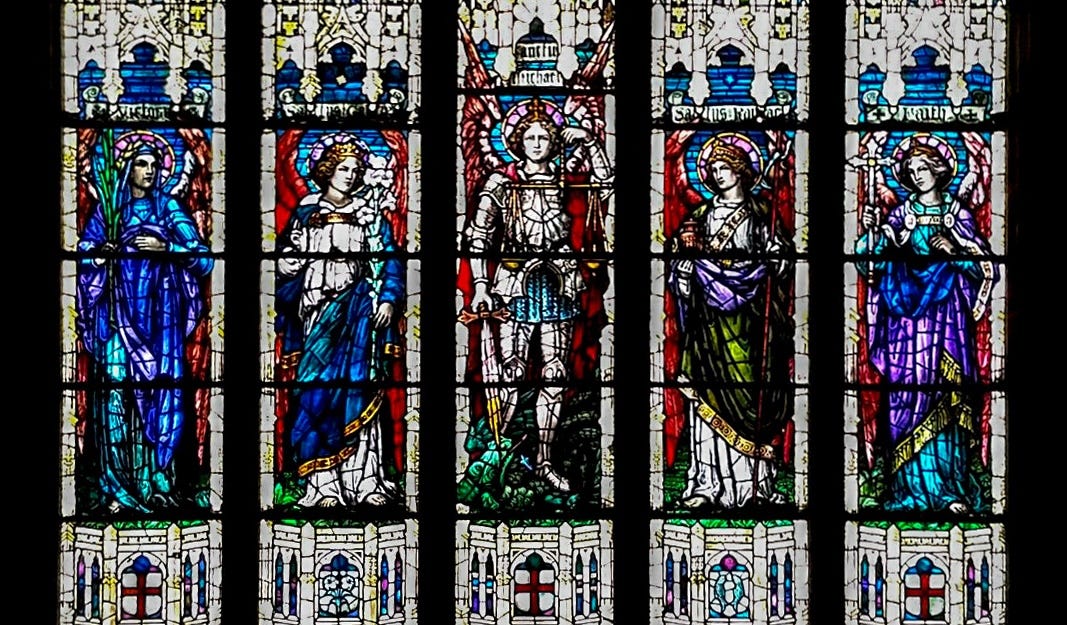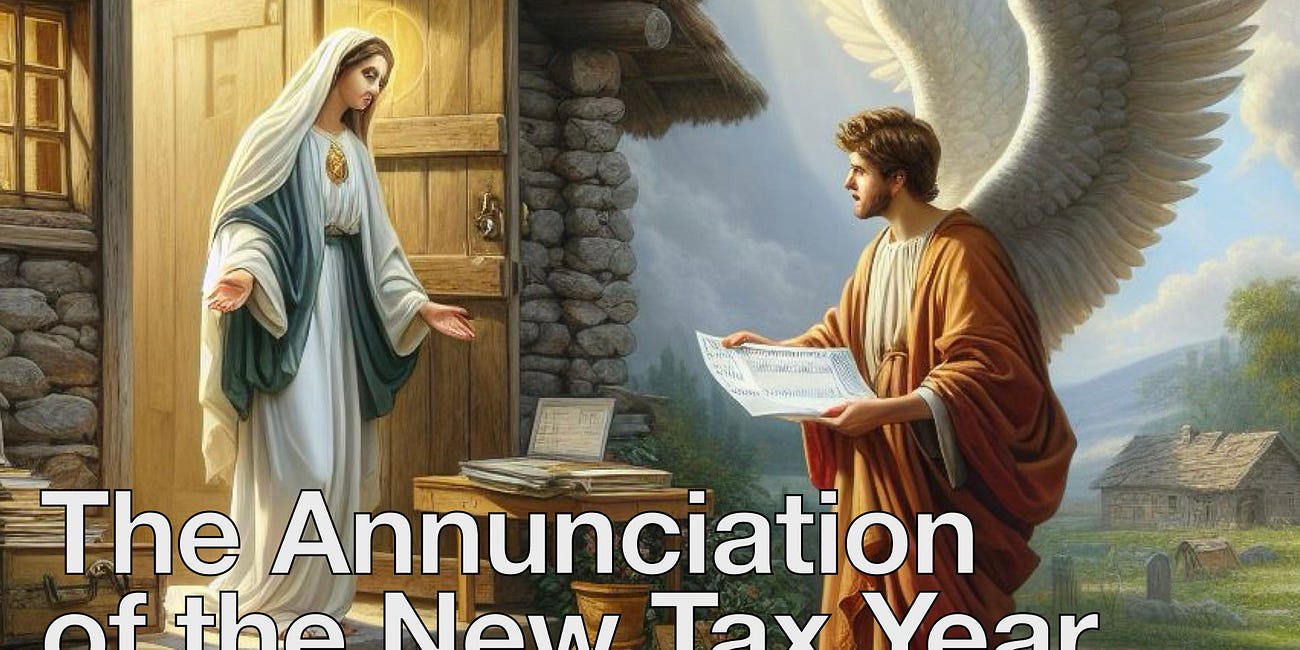St Michael was a big deal for a long time. In fact, in England, over 800 churches are named after him, many of which were founded in Anglo-Saxon times. The only dedications more popular than St Michael (with or without ‘All Angels’) are Mary, Peter and All Saints.
St Michael had his own feast day going back to Anglo-Saxon times: Michaelmas – on 29th September – marking the halfway point between Midsummers Day and Christmas Day. As such, Michaelmas was a ‘quarter day’ when rents were paid and contracts settled. (The other quarter day is Lady Day.) Michaelmas was also the time of year when servants could change employer, and possibly be paid at a new, higher rate.
But who is this St Michael?
He is not an early Christian canonised by the church or even an apostle. We are talking about the Archangel Michael himself, the one who throws down the ancient serpent Satan, according to Revelation 12:7-9
Now war arose in heaven, Michael and his angels fighting against the dragon. And the dragon and his angels fought back, but he was defeated, and there was no longer any place for them in heaven. And the great dragon was thrown down, that ancient serpent, who is called the devil and Satan, the deceiver of the whole world—he was thrown down to the earth, and his angels were thrown down with him.
This presents us with a puzzle. Michael seems have an extremely important role in the defeat of Satan. So why is he only mentioned by name five times in the Bible? Michael argues with the devil over the body of Moses in Jude 1:9. Michael’s name crops up three more times in that part of Daniel that most preachers tend to avoid, being so cryptic, apocalyptic and strange (although I’m sure it will all make sense when Christ returns).
Ask for the Archangel By Name
There are interesting debates to be had about the names and numbers of other archangels. Gabriel’s status as an archangel is more implicit. But what about Raphael? He is mentioned by name in the Book of Tobit, a book recognised by the Church of England as apocryphal, as is 2 Esdras which testifies to the Archangel Uriel. These are not books from the Canon of Scripture, but the Church of England’s 39 Articles says we:
“doth read [these apocryphal books] for example of life and instruction of manners; but yet doth it not apply them to establish any doctrine.” (Article VI)
And there’s the rub. These saints are only named by non-Biblical books on which we don’t rest any doctrine so… what’s the point?
This would imply that the most important thing in the world is doctrine. Doctrine is really important. Yes, it is, my fellow reformed friend. But what is the first question in the Westminster Catechism? Does it say that the chief end of man is to figure out God and get his doctrine right forever?
No. It does not.
It says the chief end of man is to glorify God and enjoy him forever. Is it not right that we understand the cosmos the Lord has created? If we to stand around the throne of the King of Kings singing songs of praise, are we not interested in the angels and archangels who join us?
Fear of Angels
We may be frightened to talk about the angels. This is not because angels are frightening, although they are. The (arch)angel Gabriel is telling everyone to ‘fear not’ in the Christmas story. But we may be afraid to understand angels because scripture warns us about worshipping them. John falls at the feet of an angel in Revelation 19:10 who tells him:
“You must not do that! I am a fellow servant with you and your brothers who hold to the testimony of Jesus. Worship God.”
The Apostle Paul issues a longer warning about getting carried away with angelic worship in Colossians 2:18-19.
Let no one disqualify you, insisting on asceticism and worship of angels, going on in detail about visions, puffed up without reason by his sensuous mind, and not holding fast to the Head, from whom the whole body, nourished and knit together through its joints and ligaments, grows with a growth that is from God.
But it’s very easy to guard against a sin we are not likely to commit. Hardly anyone reading these words is in danger of bowing the knee to angels and go on about detailed visions.
What is the Point of Angels?
We are more likely to ignore the angels completely because we don’t really see the point of them – even if we’re Christians. In fact, especially because we are Christians. We believe in God’s omnipotence. So we don’t understand why God should send a messenger to tell Mary to tell her she is going to bear a son and call him Jesus. Can’t he just implant that message in her head? Or give her a vision?
Why send the Angel of Death to strike down the firstborn Egyptians at the Passover in Exodus? Couldn’t God just cause those who were to be killed to die in their sleep? And why does the Lord send a heavenly host of chariots and horses of fire in 2 Kings 6 only to strike Aram’s army with blindness? There are many angelic encounters and interventions in scripture that seem, well, unnecessary.
Moreover, how is it that St Michael and his angels throw down Satan? Doesn’t Christ himself do that? Isn’t that what happens on the cross? This leads some to speculate that St Michael is, essentially, Christ.
The Embodied Word
Firstly, there’s a lot to be said for simply taking scripture at face value. There simply are angels and archangels. It says the Archangel Michael throws down Satan. So let’s accept that. God has created angels – and us – for a reason. If we don’t understand that, or see the point of it, well, that’s on us. Our finite minds may never understand the complexities of the universe – but isn’t it fun finding out? Are we even curious? Why aren’t we reading the apocrypha “for example of life and instruction of manners”? I’m interested that I’m so cold hearted, I would rather have my heart strangely warmed by a murder-mystery book, rather than 2 Esdras, Tobit or Maccabees. These are books the apostles would have known – and quoted in what we consider Scripture.
Secondly, our modern Christian faith is disembodied. You could say it is dangerously gnostic, which means that spirit and flesh are firmly divided, or even antithetical. Blinded by the scientism of our age, we have turned God into mere laws of nature like Newtonian physics or Boyle’s Law – that can be miraculously suspended by divine command. But usually aren’t. (Newton and Boyle would be appalled at this. Okay, Boyle would be. Newton is harder to read.)
We’ve been seduced by Jedi mind tricks into thinking that God is a nebulous impersonal Force that can be harnessed. The result is that we have made earthly tasks and physical action to be too petty and demeaning for heavenly beings.
But they are not. Did God not speak a physical world into being? Did he not make man in his own image? And did he not give man dominion over the earth?
And let us remember our other quarter days. On Lady Day, did not Gabriel tell Mary that God would take on human flesh, entering that world he made? Was he not conceived that day? And on Christmas Day, was Christ not born into this world as a helpless babe?
Does Christ not physically suffer on the cross and die? Did he not institute a physical meal in order to remember that sacrifice? And did Christ not rise again? Really and truly? Bodily and physically?
Has this Incarnate Christ not ascended into heaven and is he seated in the heavenly realms at the right hand of the Father? Will he not return, in person, and will the dead not be raised? Will there not be a new heaven and a new earth where we will dwell with the LORD God for ever?
Christ is risen! Satan and his angels have been thrown down by the Archangel Michael and his angels. If that’s not a cause of celebration and feasting, what is?
So enjoy your traditional goose on Michaelmas. (We had to make a request to our butcher especially. And they are not cheap!)
Don’t pray to St Michael. Don’t worship him. But it’s probably okay to raise a glass.
A Brand New Touring Show for 2025
I’ve started to write my new tour show – in which I hope to explain all 66 books of the Bible in 59 minutes. With jokes. I’m really enjoying it and I’m quite excited. Which is unlike me.
If you’d like me to come and do this at your church sometime next year, why don’t you get in touch via my website? Move fast if you want to book a Friday or Saturday. I’ve already booked up one of those! ‘Reply to’ this email or go here:
When is a Dragon Not A Dragon?
On the Popcorn Parenting podcast a few years ago, Nate Morgan Locke – the Reformed Mythologist – ask a good question: if you can train it, is it a dragon? That podcast is now a YouTube video:
Lady Day
25th March is Lady Day. If we’re being strictly Anglican about it, we should called it the Annunciation of Our Lord, a principal feast. This is not just an anti-Catholic post-Reformation rebranding exercise, rolling back the Cult of the Virgin Mary. This day has always been about the Angel Gabriel’s visit to Mary, being precisely nine months before Chri…





